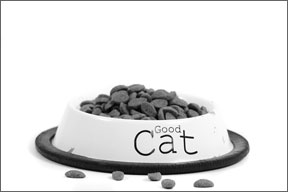Conventional wisdom has long held that cats need less protein as they age. The truth is exactly the opposite, says Joseph Wakshlag, DVM, Ph.D., Associate Professor of Nutrition at the Cornell University College of Veterinary Medicine.

288
“What we realize in geriatrics is that nobody pays much attention to muscle mass. We’re starting to realize you lose muscle mass as you age — human, dog, cat. You can’t reverse it,” he says. “You have to lift weights to maintain current muscle mass, but it’s hard to get a cat to lift weights.”
However, you may be able to slow loss of muscle mass with a higher-protein diet, Dr. Wakshlag says. “Cats need double the protein dogs need because they are obligate carnivores, eating mainly animal protein because most plant-based proteins don’t have an the appropriate amino acid profile.”
Geriatric Screening. Do have your cat undergo a geriatric blood screen before you launch a higher-protein diet, however. “There are some conditions like kidney failure in older cats where a high-protein diet could be detrimental,” Dr. Wakshlag says. He discusses other essentials of nutrition for seniors in this Q & A.:
Q: Are senior foods necessary for geriatric cats?
A: There is no evidence that seniors need it, and it is always based on the individual. Whether it’s necessary depends not on your cat’s age but his health.
Q: When does a cat become a senior?
A: In cats it’s based on patterns, metabolism and obesity. Adult years are from 1 or 2 to 7 or 8. Then they have the golden years, which are 7 or 8 to 12, comparable to the 50s for people. They’re seniors after 12.
Q: Do senior cats have different nutritional needs compared to adults, or is that need simply promoted by the pet food industry?
A: It is pretty much marketing from the pet food industry. Every senior is a little different, and you simply can’t say, “Use this kind of food because your cat is this age.”
Q: When is it a good idea to switch to senior food?
A: It’s important to base it on what you see happening. Is your cat getting fat? In that case he needs a light food.
Q: Do cats tend to either gain or lose weight as they age, as people do?
A: Yes, they do.
Q: Are all senior foods pretty much the same?
A: There is quite a variety because it depends on the manufacturer’s philosophy. Some will make higher protein and higher fat, and some the opposite, all based on two basic philosophies. The first philosophy is that older cats tend to get obese and develop metabolic problems in the liver and kidneys, and because they can develop these problems, the manufacturers think you should put your cat on these foods to deal with these issues. It creates a marketing niche for low-protein, low-fat food.

288
The second philosophy is that since some seniors tend to lose weight — and that’s a fairly big trend in cats — use a higher-protein and higher-fat content because the digestive capability is slightly diminished in older patients. That’s why it’s important to know a geriatric’s weight and body condition, and having a yearly blood screen is a great idea because it allows you to tailor your food choice. Don’t just grab Senior Food X because it can be different from Senior Food Y. Work with the veterinarian to figure out what your cat needs.
Q: Is there an ideal ratio of ingredients that we should look for?
A: It depends on what the blood panel indicates.
Q: Do seniors digest food more slowly, and if so, how does that factor in choosing food?
A: It’s not more slowly but a little less efficiently. Look for more digestible foods and lower fiber. If you have an overweight cat, you have to have higher fiber because you’re trying to decrease calories. But ingredients should be digestible. Typically, you can’t find information on digestibility on the label. If the fiber content in the food you are considering are similar to the one you are currently feeding, just choose the one you are most interested in, and if the feces are smaller and look better, then its likely more digestible.
Q: Do seniors need less phosphorus to help avoid kidney disease or is that concept outdated?
A: Phosphorus needs are completely dependent on whether or not your cat has kidney problems. A blood panel will indicate any kidney problems.
Q: Many seniors seem to be on therapeutic commercial food. Are those acceptable for long-term health?
A: Most of them, yes. It depends on the problem. Those made for urinary stones are high in sodium. If a senior cat has a heart or kidney problem, you shouldn’t be feeding those.
Q: Because seniors tend to take more pills than adults, what are the best foods or treats to hide the pills?
A: Try a low-sodium peanut butter or a banana. Pill Pockets aren’t too bad. Stay away from hotdogs and lunch meat because they’re high in salt.
Q: If there is no need for senior food, should owners choose all-life stages or adult food?
A: A lot of adult foods are all-life stages anyway. The reality is if the cat is doing fine and doesn’t have any problems, is not too lean or heavy, stick with what you’ve been doing.
Q: How do you know when and how much to decrease or increase their food?
A: You can tell by body condition.


